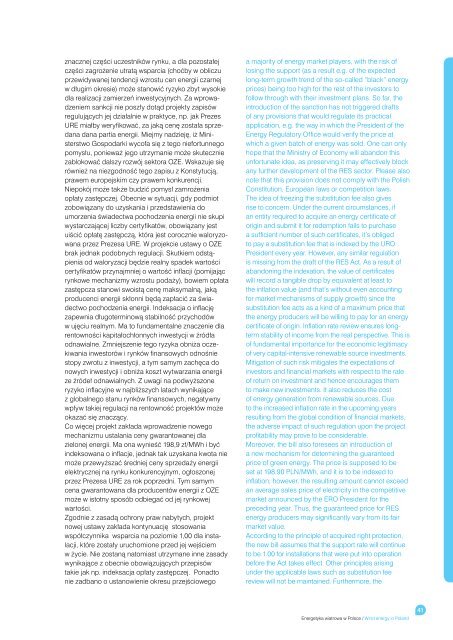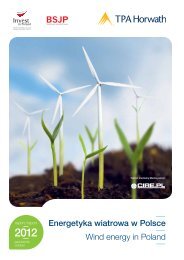Energetyka wiatrowa w Polsce Wind energy in Poland - TPA Horwath
Energetyka wiatrowa w Polsce Wind energy in Poland - TPA Horwath
Energetyka wiatrowa w Polsce Wind energy in Poland - TPA Horwath
You also want an ePaper? Increase the reach of your titles
YUMPU automatically turns print PDFs into web optimized ePapers that Google loves.
znacznej części uczestników rynku, a dla pozostałej<br />
części zagrożenie utratą wsparcia (choćby w obliczu<br />
przewidywanej tendencji wzrostu cen energii czarnej<br />
w długim okresie) może stanowić ryzyko zbyt wysokie<br />
dla realizacji zamierzeń <strong>in</strong>westycyjnych. Za wprowadzeniem<br />
sankcji nie poszły dotąd projekty zapisów<br />
regulujących jej działalnie w praktyce, np. jak Prezes<br />
URE miałby weryfikować, za jaką cenę została sprzedana<br />
dana partia energii. Miejmy nadzieję, iż M<strong>in</strong>isterstwo<br />
Gospodarki wycofa się z tego niefortunnego<br />
pomysłu, ponieważ jego utrzymanie może skutecznie<br />
zablokować dalszy rozwój sektora OZE. Wskazuje się<br />
również na niezgodność tego zapisu z Konstytucją,<br />
prawem europejskim czy prawem konkurencji.<br />
Niepokój może także budzić pomysł zamrożenia<br />
opłaty zastępczej. Obecnie w sytuacji, gdy podmiot<br />
zobowiązany do uzyskania i przedstawienia do<br />
umorzenia świadectwa pochodzenia energii nie skupi<br />
wystarczającej liczby certyfikatów, obowiązany jest<br />
uiścić opłatę zastępczą, która jest corocznie waloryzowana<br />
przez Prezesa URE. W projekcie ustawy o OZE<br />
brak jednak podobnych regulacji. Skutkiem odstąpienia<br />
od waloryzacji będzie realny spadek wartości<br />
certyfikatów przynajmniej o wartość <strong>in</strong>flacji (pomijając<br />
rynkowe mechanizmy wzrostu podaży), bowiem opłata<br />
zastępcza stanowi swoistą cenę maksymalną, jaką<br />
producenci energii skłonni będą zapłacić za świadectwo<br />
pochodzenia energii. Indeksacja o <strong>in</strong>flację<br />
zapewnia długoterm<strong>in</strong>ową stabilność przychodów<br />
w ujęciu realnym. Ma to fundamentalne znaczenie dla<br />
rentowności kapitałochłonnych <strong>in</strong>westycji w źródła<br />
odnawialne. Zmniejszenie tego ryzyka obniża oczekiwania<br />
<strong>in</strong>westorów i rynków f<strong>in</strong>ansowych odnośnie<br />
stopy zwrotu z <strong>in</strong>westycji, a tym samym zachęca do<br />
nowych <strong>in</strong>westycji i obniża koszt wytwarzania energii<br />
ze źródeł odnawialnych. Z uwagi na podwyższone<br />
ryzyko <strong>in</strong>flacyjne w najbliższych latach wynikające<br />
z globalnego stanu rynków f<strong>in</strong>ansowych, negatywny<br />
wpływ takiej regulacji na rentowność projektów może<br />
okazać się znaczący.<br />
Co więcej projekt zakłada wprowadzenie nowego<br />
mechanizmu ustalania ceny gwarantowanej dla<br />
zielonej energii. Ma ona wynieść 198,9 zł/MWh i być<br />
<strong>in</strong>deksowana o <strong>in</strong>flacje, jednak tak uzyskana kwota nie<br />
może przewyższać średniej ceny sprzedaży energii<br />
elektrycznej na rynku konkurencyjnym, ogłoszonej<br />
przez Prezesa URE za rok poprzedni. Tym samym<br />
cena gwarantowana dla producentów energii z OZE<br />
może w istotny sposób odbiegać od jej rynkowej<br />
wartości.<br />
Zgodnie z zasadą ochrony praw nabytych, projekt<br />
nowej ustawy zakłada kontynuację stosowania<br />
współczynnika wsparcia na poziomie 1,00 dla <strong>in</strong>stalacji,<br />
które zostały uruchomione przed jej wejściem<br />
w życie. Nie zostaną natomiast utrzymane <strong>in</strong>ne zasady<br />
wynikające z obecnie obowiązujących przepisów<br />
takie jak np. <strong>in</strong>deksacja opłaty zastępczej. Ponadto<br />
nie zadbano o ustanowienie okresu przejściowego<br />
a majority of <strong>energy</strong> market players, with the risk of<br />
los<strong>in</strong>g the support (as a result e.g. of the expected<br />
long-term growth trend of the so-called “black” <strong>energy</strong><br />
prices) be<strong>in</strong>g too high for the rest of the <strong>in</strong>vestors to<br />
follow through with their <strong>in</strong>vestment plans. So far, the<br />
<strong>in</strong>troduction of the sanction has not triggered drafts<br />
of any provisions that would regulate its practical<br />
application, e.g. the way <strong>in</strong> which the President of the<br />
Energy Regulatory Office would verify the price at<br />
which a given batch of <strong>energy</strong> was sold. One can only<br />
hope that the M<strong>in</strong>istry of Economy will abandon this<br />
unfortunate idea, as preserv<strong>in</strong>g it may effectively block<br />
any further development of the RES sector. Please also<br />
note that this provision does not comply with the Polish<br />
Constitution, European laws or competition laws.<br />
The idea of freez<strong>in</strong>g the substitution fee also gives<br />
rise to concern. Under the current circumstances, if<br />
an entity required to acquire an <strong>energy</strong> certificate of<br />
orig<strong>in</strong> and submit it for redemption fails to purchase<br />
a sufficient number of such certificates, it’s obliged<br />
to pay a substitution fee that is <strong>in</strong>dexed by the URO<br />
President every year. However, any similar regulation<br />
is miss<strong>in</strong>g from the draft of the RES Act. As a result of<br />
abandon<strong>in</strong>g the <strong>in</strong>dexation, the value of certificates<br />
will record a tangible drop by equivalent at least to<br />
the <strong>in</strong>flation value (and that’s without even account<strong>in</strong>g<br />
for market mechanisms of supply growth) s<strong>in</strong>ce the<br />
substitution fee acts as a k<strong>in</strong>d of a maximum price that<br />
the <strong>energy</strong> producers will be will<strong>in</strong>g to pay for an <strong>energy</strong><br />
certificate of orig<strong>in</strong>. Inflation rate review ensures longterm<br />
stability of <strong>in</strong>come from the real perspective. This is<br />
of fundamental importance for the economic legitimacy<br />
of very capital-<strong>in</strong>tensive renewable source <strong>in</strong>vestments.<br />
Mitigation of such risk mitigates the expectations of<br />
<strong>in</strong>vestors and f<strong>in</strong>ancial markets with respect to the rate<br />
of return on <strong>in</strong>vestment and hence encourages them<br />
to make new <strong>in</strong>vestments. It also reduces the cost<br />
of <strong>energy</strong> generation from renewable sources. Due<br />
to the <strong>in</strong>creased <strong>in</strong>flation rate <strong>in</strong> the upcom<strong>in</strong>g years<br />
result<strong>in</strong>g from the global condition of f<strong>in</strong>ancial markets,<br />
the adverse impact of such regulation upon the project<br />
profitability may prove to be considerable.<br />
Moreover, the bill also foresees an <strong>in</strong>troduction of<br />
a new mechanism for determ<strong>in</strong><strong>in</strong>g the guaranteed<br />
price of green <strong>energy</strong>. The price is supposed to be<br />
set at 198.90 PLN/MWh, and it is to be <strong>in</strong>dexed to<br />
<strong>in</strong>flation; however, the result<strong>in</strong>g amount cannot exceed<br />
an average sales price of electricity <strong>in</strong> the competitive<br />
market announced by the ERO President for the<br />
preced<strong>in</strong>g year. Thus, the guaranteed price for RES<br />
<strong>energy</strong> producers may significantly vary from its fair<br />
market value.<br />
Accord<strong>in</strong>g to the pr<strong>in</strong>ciple of acquired right protection,<br />
the new bill assumes that the support rate will cont<strong>in</strong>ue<br />
to be 1.00 for <strong>in</strong>stallations that were put <strong>in</strong>to operation<br />
before the Act takes effect. Other pr<strong>in</strong>ciples aris<strong>in</strong>g<br />
under the applicable laws such as substitution fee<br />
review will not be ma<strong>in</strong>ta<strong>in</strong>ed. Furthermore, the<br />
<strong>Energetyka</strong> <strong>wiatrowa</strong> w <strong>Polsce</strong> / <strong>W<strong>in</strong>d</strong> <strong>energy</strong> <strong>in</strong> <strong>Poland</strong><br />
41



